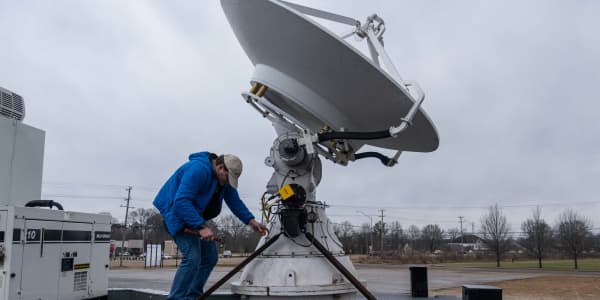The U.S. Supreme Court decision that upheld most of Obamacare also rejected the section of the Affordable Care Act that would have compelled states to expand eligibility in their Medicaid programs to nearly all poor adults.
That part of the ruling received far less public attention — but it's that part that likely has had the biggest impact on states over the past four years.
States such as California, New Jersey, Kentucky and Arkansas, which have expanded their Medicaid programs, have seen sharp decreases in their uninsured rates. States that didn't expand Medicaid, such as Texas, Florida and Virginia, did not experience as much of a drop in the number of people without health insurance.
So far, 31 states and the District of Columbia have expanded their Medicaid programs under the ACA to cover adults who earn up to 138 percent of the federal poverty level — or $16,394 per year.
Advocates of expansion say that a decision to not expand can negatively affect the finances of a state's hospitals, the tax burden born by its residents and the premiums residents pay for private insurance plan coverage.
Expansion states have seen a marked reduction in unpaid bills at their hospitals, which in turn reduces the need for hospitals to pass along some of their costs to taxpayers and people with health coverage.
Expansion advocates also tout the fact, in arguing that expansion would benefit states, that the ACA requires the federal government to fund nearly all the costs of covering people enrolled under expanded eligibility. In the first three years of expansion, the federal government picked up 100 percent of the bill. Over time that share will drift down, but to no less than 90 percent of those costs in future years.
The Louisiana purchase
The most recent expansion state — Louisiana — is being closely watched as the ideological and financial battle over Obamacare continues to play out at the state level.
As the 2016 fiscal year comes to a close, first-term Gov. John Bel Edwards and the state legislature have been in crisis mode, struggling to close a fiscal 2017 budget gap that could run as high $800 million.
Edwards' predecessor, Republican Bobby Jindal, had been among the national leaders in opposition to Obamacare's Medicaid expansion — Jindal argued it would cost the state at least $1.7 billion over a decade. But a recent estimate suggests otherwise, saying expansion of Medicaid could save the state close to $1 billion through federal matching funds.
Louisiana, prior to expansion, had about 192,000 people in a coverage gap — that is, they earned too little to qualify for subsidies to help pay for private Obamacare insurance but too much to qualify for traditional Medicaid.
By the end of June, with expansion under way, more than 225,900 people had signed up for Medicaid in Louisiana.
Nationwide, Medicaid enrollment has spiked since implementation of the ACA. Those increases have come not only among people who are newly eligible but also among those who were previously eligible and for whatever reason had not yet signed up for the coverage.
In March the federal Centers for Medicare and Medicare Services reported that almost 72.5 million people were enrolled in Medicaid or the affiliated Children's Health Insurance Program across the United States.
That's 15 million additional people since Obamacare's first open enrollment began in the fall of 2013 — a 26.5 percent jump. It's also almost 4 million people more than the number of customers enrolled in private Obamacare insurance plans sold on government exchanges this year.
Expansion has made "a critical difference" in cutting the nation's uninsured rate to below 10 percent for the first time ever, said Sara Collins, vice president of the Commonwealth Fund's health-care coverage and access program.
A report issued in June by the Health and Human Services Department illustrates how the extent of the coverage gains in individual states were closely linked to their Medicaid expansion decisions.
Expansion states, on average, cut their uninsured rates nearly in half, according to the HHS report. But non-expansion states saw a reduction of only one-third.
Most recent data shows that states that didn't expand Medicaid had an average uninsured rate of 15.4 percent. In contrast, expansion states have an uninsured rate of just 9.3 percent.
The biggest holdouts to Medicaid expansion, in terms of affected population, are Texas and Florida. Both states continue to have significantly higher uninsured rates than the national average of less than 10 percent.
The uninsured trend
Collins said that the effect of a Medicaid expansion decision in driving down an individual state's uninsured rate is starkly seen in the examples of Georgia, which did not expand, and another southern state, Kentucky, which did expand.
In 2013, before full implementation of Obamacare, Georgia and Kentucky had comparable uninsurance rates, 21.4 percent and 20.4 percent, respectively, according to the Gallup-Healthways Well-Being Index.
But 2015, Georgia had seen a 5.5 percentage-point reduction in its uninsured rate, down to 15.9 percent. Much of that decrease was due to enrollment by Georgians in private individual insurance plans sold either on new Obamacare government health exchanges or outside of those marketplaces.
But Kentucky, which ran its own Obamacare insurance marketplace and expanded Medicaid, saw its uninsured rate plunge by 12.9 percentage points, landing at 7.5 percent of all state residents as of 2015.
Kentucky also saw a decline in the number of low-income people who reported having difficulties getting access to health care because of cost, Collins noted.
In Georgia, for the number of such people having a tough time affording health care, "it actually increased or did not change at all," Collins said.
HHS's report noted that visits to community health centers increased by 46 percent in expansion states compared to just 12 percent in non-expansion states.
And Medicaid prescription rates jumped by more than 25 percent in expansion states compared to an increase of just 2.8 percent in states that did not expand.
Right now it's pretty clear that not having access to Medicaid [expansion] in those 19 states is a pretty clear barrier to insuring more people.Rachel Garfieldsenior researcher at the Kaiser Family Foundation
A recent Commonwealth Fund study co-authored by Collins looked at how much low-income people, who would otherwise be eligible for Medicaid if their state had expanded the program, would pay in premiums and out-of-pocket health costs if they enrolled in "silver" Obamacare plans and if they were "medium" users of health care.
The totals varied widely, from $334 in annual premium and out-of-pocket costs for Obamacare silver plan customers in Texas, up to $764 in such costs in Kansas
If the states had expanded Medicaid, these people would not have to pay a premium and would also be better shielded from out-of-pocket charges than in an Obamacare marketplace plan. The report also pointed out that the primary reason that people with low incomes don't enroll in Obamacare plans "is that they find the premiums unaffordable.
Rachel Garfield, a senior researcher at the Kaiser Family Foundation, said that phenomenon, combined with the continued reluctance of 19 states to expand Medicaid, could present a major roadblock to Obamacare getting significantly more people enrolled in health coverage nationally in coming years.
"Right now it's pretty clear that not having access to Medicaid [expansion] in those 19 states is a pretty clear barrier to insuring more people," Garfield said.
None of the non-expansion states, with the exception of Wisconsin, allows adults without dependent children to enroll in Medicaid, regardless of how low their income is. But most non-expansion states have much lower income caps for Medicaid enrollment by adults with children. Wisconsin allows adults with dependent children who earn around 100 percent of the poverty level — $11,880 — to enroll in Medicaid, and Maine and Tennessee each have slightly higher caps.
Texas' cap, the lowest in the nation, is just 18 percent of poverty, or $2,138. Texas is the largest state holding out against Medicaid expansion. Garfield's research at Kaiser has found that about 766,000 of Texas' poor earn too much to qualify for traditional Medicaid but still earn less than 100 percent of poverty, which is the minimum they would need to earn to qualify for federal subsidies to buy private Obamacare plans.
Opponents of Medicaid expansion have said they object to it for a variety of reasons. Those include arguments that Medicaid itself is broken and should not add more covered people, that working-age able-bodied people should not receive health coverage at no cost to themselves, concerns that the federal government will eventually renege on its promise to subsidize the lion's share of expansion costs, and objections to adding to state budget obligations.
A big hospital bill
But in addition to presenting a barrier to health coverage, the lack of Medicaid expansion in some states has also been a barrier toward driving down the level of so-called "uncompensated care." That care is health services provided by hospitals to people who lack Medicaid or any other kind of insurance coverage, leaving the hospital unpaid.
Garfield noted that after Obamacare kicked into high gear in 2014, "we saw substantial declines nationally in uncompensated care." But Garfield added, "Almost all of this decline was in expansion states."
At the same time, Garfield said, the Affordable Care Act "actually reduced the amount of uncompensated-care reimbursement to the states." In other words, hospitals in non-expansion states were not seeing much, if any, reduction in their uncompensated-care costs at the same time their states were getting less money from the federal government to offset those costs.
The amount of money at stake can be dramatic.
"You're looking at the uncompensated care in Texas still up in the $4- billion- to $5-billion-a-year range," said Lance Lunsford, spokesman for the Texas Hospital Association. "A large portion of that [uncompensated-care burden] would be relieved" if Texas expanded Medicaid, Lunsford said.
Hospitals end up eating some of those costs. But the remaining share, Lunsford noted, is covered by property taxes in the counties where the hospitals are located, as well as by "higher premiums" for insured people, whose health plans end up being charged higher rates for services than they would otherwise be if more people had health coverage.
Despite that, Lunsford said, "a lot of folks think they're not affected by the high rate of uninsured" in the state. "They don't really see it as their problem, sometimes." Although Texas hospitals have tried to make the case that lack of coverage for hundreds of thousands of people is indeed a problem for all state residents, they haven't been successful in convincing Gov. Gregg Abbott to abandon his staunch opposition to expanding Medicaid.
In the meantime, those hospitals will be watching what happens to their counterparts in the neighboring state of Louisiana.
James Richardson, alumni professor of economics at Louisiana State University, in May noted that the state had an obligation to fund care for uninsured patients whether or not it expanded Medicaid, and estimated that Louisiana stood to gain between $810 million to $864 million in federal support by expanding the program.
Paul Salles, the president and CEO of the Louisiana Hospital Association, likewise emphasized the financial benefits from expansion for both individuals and the state after Gov. John Bel Edwards signed an executive order setting expansion into motion.
"Reducing the number of uninsured adults in Louisiana makes it easier to improve access to needed care, to limit costs for families and individuals with private insurance and to create greater stability in Louisiana's state budget," Salles said.







